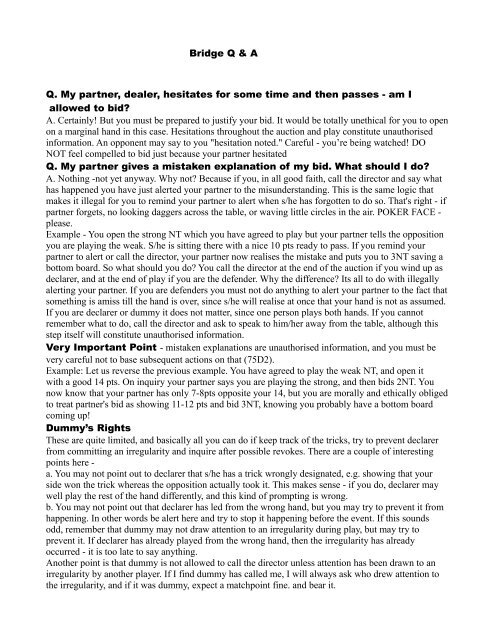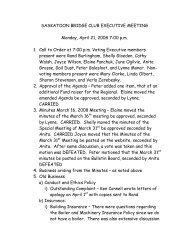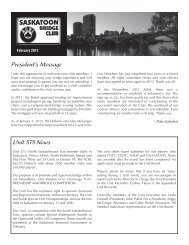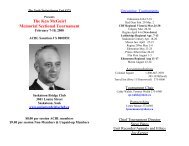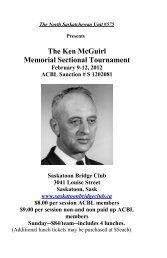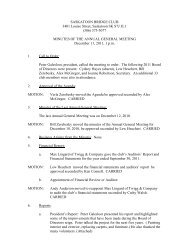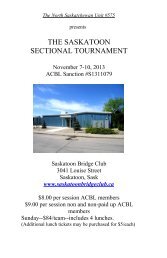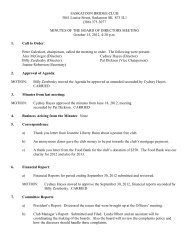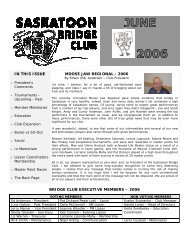Bridge Questions and Answers - saskatoon bridge club
Bridge Questions and Answers - saskatoon bridge club
Bridge Questions and Answers - saskatoon bridge club
Create successful ePaper yourself
Turn your PDF publications into a flip-book with our unique Google optimized e-Paper software.
<strong>Bridge</strong> Q & A<br />
Q. My partner, dealer, hesitates for some time <strong>and</strong> then passes - am I<br />
allowed to bid?<br />
A. Certainly! But you must be prepared to justify your bid. It would be totally unethical for you to open<br />
on a marginal h<strong>and</strong> in this case. Hesitations throughout the auction <strong>and</strong> play constitute unauthorised<br />
information. An opponent may say to you "hesitation noted." Careful - you’re being watched! DO<br />
NOT feel compelled to bid just because your partner hesitated<br />
Q. My partner gives a mistaken explanation of my bid. What should I do?<br />
A. Nothing -not yet anyway. Why not? Because if you, in all good faith, call the director <strong>and</strong> say what<br />
has happened you have just alerted your partner to the misunderst<strong>and</strong>ing. This is the same logic that<br />
makes it illegal for you to remind your partner to alert when s/he has forgotten to do so. That's right - if<br />
partner forgets, no looking daggers across the table, or waving little circles in the air. POKER FACE -<br />
please.<br />
Example - You open the strong NT which you have agreed to play but your partner tells the opposition<br />
you are playing the weak. S/he is sitting there with a nice 10 pts ready to pass. If you remind your<br />
partner to alert or call the director, your partner now realises the mistake <strong>and</strong> puts you to 3NT saving a<br />
bottom board. So what should you do? You call the director at the end of the auction if you wind up as<br />
declarer, <strong>and</strong> at the end of play if you are the defender. Why the difference? Its all to do with illegally<br />
alerting your partner. If you are defenders you must not do anything to alert your partner to the fact that<br />
something is amiss till the h<strong>and</strong> is over, since s/he will realise at once that your h<strong>and</strong> is not as assumed.<br />
If you are declarer or dummy it does not matter, since one person plays both h<strong>and</strong>s. If you cannot<br />
remember what to do, call the director <strong>and</strong> ask to speak to him/her away from the table, although this<br />
step itself will constitute unauthorised information.<br />
Very Important Point - mistaken explanations are unauthorised information, <strong>and</strong> you must be<br />
very careful not to base subsequent actions on that (75D2).<br />
Example: Let us reverse the previous example. You have agreed to play the weak NT, <strong>and</strong> open it<br />
with a good 14 pts. On inquiry your partner says you are playing the strong, <strong>and</strong> then bids 2NT. You<br />
now know that your partner has only 7-8pts opposite your 14, but you are morally <strong>and</strong> ethically obliged<br />
to treat partner's bid as showing 11-12 pts <strong>and</strong> bid 3NT, knowing you probably have a bottom board<br />
coming up!<br />
Dummy’s Rights<br />
These are quite limited, <strong>and</strong> basically all you can do if keep track of the tricks, try to prevent declarer<br />
from committing an irregularity <strong>and</strong> inquire after possible revokes. There are a couple of interesting<br />
points here -<br />
a. You may not point out to declarer that s/he has a trick wrongly designated, e.g. showing that your<br />
side won the trick whereas the opposition actually took it. This makes sense - if you do, declarer may<br />
well play the rest of the h<strong>and</strong> differently, <strong>and</strong> this kind of prompting is wrong.<br />
b. You may not point out that declarer has led from the wrong h<strong>and</strong>, but you may try to prevent it from<br />
happening. In other words be alert here <strong>and</strong> try to stop it happening before the event. If this sounds<br />
odd, remember that dummy may not draw attention to an irregularity during play, but may try to<br />
prevent it. If declarer has already played from the wrong h<strong>and</strong>, then the irregularity has already<br />
occurred - it is too late to say anything.<br />
Another point is that dummy is not allowed to call the director unless attention has been drawn to an<br />
irregularity by another player. If I find dummy has called me, I will always ask who drew attention to<br />
the irregularity, <strong>and</strong> if it was dummy, expect a matchpoint fine. <strong>and</strong> bear it.
Contested claims (70)<br />
This is the biggie. If you remember nothing else from this page, remember the following. An opponent<br />
claims the remaining tricks, but you disagree because you think you can take one or more. What most<br />
players will do now is utter what I describe as the four craziest words in <strong>bridge</strong> - "Play it out please".<br />
Crazy because what you have just said to the claimer is "I believe I can take a trick". Claimer will then<br />
quickly work out what it might be, e.g. a remaining trump, <strong>and</strong> promptly take it off you. Those four<br />
crazy words will usually cost you a trick. O.K. That’s what you don’t do. What do you do? You call<br />
the director - radical idea!!! The important thing is that once a claim is made, play ceases. If there has<br />
been any play after the claim, it will be declared void. There are a number of very important points<br />
here.<br />
a. If the claimer did not state the intended line of play at the time of the claim, it is too late now.<br />
Claimers will usually now waffle on about what they couldda/woulda/shouldda done. Tough. It’s too<br />
late.<br />
b. All cards will be faced on the table. Remember, play ceased once the the claim was made. A ruling<br />
will be made as equitably as possible but "...any doubtful points shall be resolved against the claimer"<br />
(70A).<br />
d. When there is an outst<strong>and</strong>ing trump, if a trick could be lost by any "normal" line of play, then it<br />
must be awarded to the opponent. The key to the whole page <strong>and</strong> a half covering this law is the<br />
following -<br />
"The director shall not accept from claimer any successful line of play not embraced in the original<br />
clarification statement if there is an alternative line of play that would be less successful.(70D)"<br />
Confused? What this is saying is that it does not matter how many ways claimer could have avoided<br />
losing a trick, if there is one normal line of play by which a trick could have been lost, then that’s what<br />
will be awarded.<br />
The law goes further <strong>and</strong> states that "normal" includes play that could be careless for the class of<br />
player, but not irrational. In other words if an opponent claims the last 3 tricks with the K 7 2 of<br />
trumps <strong>and</strong> you have the trump Q <strong>and</strong> two other irrelevant cards, then you will not be awarded a trick,<br />
since it would be irrational for claimer to have played anything other than the K first.<br />
So remember to engrave those words "Play it out please" indelibly into your mind <strong>and</strong> promise<br />
yourself never, ever to say them again!<br />
Q. My partner concedes the remaining tricks, but I disagree. What can I do<br />
about it"?<br />
A. Object immediately. If you do, then no such concession has occurred.(68B) But be careful here.<br />
That concession by your partner is unauthorized information, (keeps cropping up, doesn’t it?). Be<br />
careful that you can justify any play you make from now on.<br />
Duplicate Experiences<br />
By Marshall Pearlman<br />
We hesitate to say more, but. . .The subject of hesitation was introduced earlier in this series. What is<br />
not clear to many players is what to do if:<br />
• You hesitate • Partner hesitates• An opponent hesitates.<br />
1. When you hesitate (<strong>and</strong> you know it), you may think you must take some forward action or else<br />
partner is barred. This is not correct. You may make any legal bid you wish. It is partner whose<br />
actions are affected. Certainly, if your action would seem to be a choice between strength showing<br />
bids, the problem is minimized. However, if after “tanking,” you pass or make a minimum response to<br />
partner’s forcing bid, it is probable that you have conveyed “unauthorized information.” You have told<br />
partner, “I have some stuff here but not enough to make a constructive call. ”An extreme example of<br />
unethical conduct is to tank purposely as means of forcing partner to pass when you really don’t want
him to bid again. This should not work, as partner must make his response based only on his h<strong>and</strong>.<br />
2. When partner hesitates, your action is controlled by the following rule. (Paraphrasing <strong>and</strong><br />
simplifying Law 16): From among the logical alternatives, the partner of the offender must NOT<br />
choose the call reasonably suggested by the hesitation. You are not barred, but you must make your call<br />
based on your h<strong>and</strong> <strong>and</strong> the bids on the table <strong>and</strong> nothing else. For example, if you need a little extra<br />
from partner to bid game, <strong>and</strong> partner’s hesitation suggests he has it, you must not bid the game. Note<br />
that this does not mean you cannot make the bid you would have made in any case; it’s just that you<br />
must not be influenced in your choice of bids by partner’s hesitation. And if the director is called, be<br />
prepared to defend your action<br />
.When an opponent hesitates, you have a decision to make. Previously,<br />
the director should have been called immediately. The rules have changed, <strong>and</strong> now it is only<br />
necessary that all 4 players at the table agree that a hesitation occurred, <strong>and</strong> play continues for now. The<br />
director should be called if all 4 players do not agree. The idea is that you must establish your position<br />
as early as possible so as to minimize the damage <strong>and</strong> the complexity of the remedy. This is often very<br />
difficult <strong>and</strong> awkward to do, especially if playing in a <strong>club</strong> game with friends. Some players will never<br />
say anything. Most will do it only if the “tanking” is flagrant <strong>and</strong> seems likely to significantly affect<br />
the outcome. But be warned. If you don’t speak immediately, it may be more difficult to prove your<br />
case later. Finally, arguments pro <strong>and</strong> con about hesitation are rampant. Many want the rules changed,<br />
some want to eliminate the issue altogether <strong>and</strong> “play on.” It is certainly not a perfect world. For now,<br />
we players have no choice but to live with the present rules <strong>and</strong> do the best we can to play fair <strong>and</strong> bid<br />
in an ethical <strong>and</strong> honest manner.<br />
DON'T VARY THE SPEED OF YOUR ACTIONS<br />
A typical violation occurs when a player doubles quickly, thinking about inflicting a large penalty<br />
on the opponents. Partner, who may get in the way by bidding something new over the double, is not<br />
entitled to know doubler's degree of optimism. It is equally improper deliberately to hesitate for a long<br />
time <strong>and</strong> then double when the issue is close. Hesitations are unavoidable, because <strong>bridge</strong> is a tough<br />
game <strong>and</strong> everyone encounters problems, but you should keep the same tempo whenever possible; take<br />
a second or two to act even when your decision is an obvious one.<br />
DON'T DRAW INFERENCES FROM THE SPEED OF YOUR PARTNER'S BIDS AND<br />
PLAYS<br />
If your partner hesitates for a long while <strong>and</strong> then passes, it is obvious that the hesitation indicates<br />
something of value (else there would be nothing to consider). However, you are ethically obligated not<br />
to make any use of this information <strong>and</strong> to act just as though partner had passed quickly. Notice that<br />
although you must try to make your calls <strong>and</strong> plays in a uniform tempo, there is nothing wrong with<br />
thinking at length when it is necessary. What is wrong is for the hesitator's partner to take an unusual<br />
action on the basis of this illegal information. Players who take advantage of such hesitations (<strong>and</strong>, for<br />
example, bid further with poor values, expecting to find unannounced strength in partner's h<strong>and</strong>)<br />
deserve to be shunned by those who know better. And they usually are.<br />
DON'T MAKE EMPHATIC GESTURES<br />
It may be tempting to slam a card down if you don't like partner's play or to speak loudly <strong>and</strong> angrily if<br />
partner's bids seem to be heading your side towards disaster, but such temptation must be resisted.<br />
Similarly, don't smile or applaud loudly if partner's actions please you. Maintain the same tone <strong>and</strong><br />
demeanor.<br />
DON'T MAKE SUPERFLUOUS COMMENTS
<strong>Bridge</strong> wouldn't be much fun if everyone had to stare grimly into space <strong>and</strong> say nothing except<br />
"pass," "three <strong>club</strong>s," <strong>and</strong> so on. You will certainly want to exchange pleasantries with your partner<br />
<strong>and</strong> the opponents, but you must make sure that they have no bearing on the game. For example,<br />
unethical tactics such as asking, "Did you bid diamonds?" when you want partner to lead a diamond<br />
don't belong in any <strong>bridge</strong> game.<br />
DON'T PRETEND TO THINK JUST TO FOOL THE OPPONENTS<br />
If an opponent leads the ace of diamonds <strong>and</strong> the only diamond in your h<strong>and</strong> is the seven, you have<br />
no problem; you must follow suit, so the only legal play is the seven of diamonds. It is unethical to<br />
hesitate in order to mislead the opponents into thinking that you had a choice of plays (<strong>and</strong> hence more<br />
than one diamond). Play at a steady pace.<br />
In short, you should convey <strong>and</strong> receive information only by means of the bids <strong>and</strong> plays that you<br />
<strong>and</strong> your partner make, <strong>and</strong> not through any other actions. We cannot urge you too strongly to pay<br />
close attention to the proprieties <strong>and</strong> become an ethical player who will be welcome in any game<br />
Reprinted (revised) from Calgary Unit 390. Used by permission


